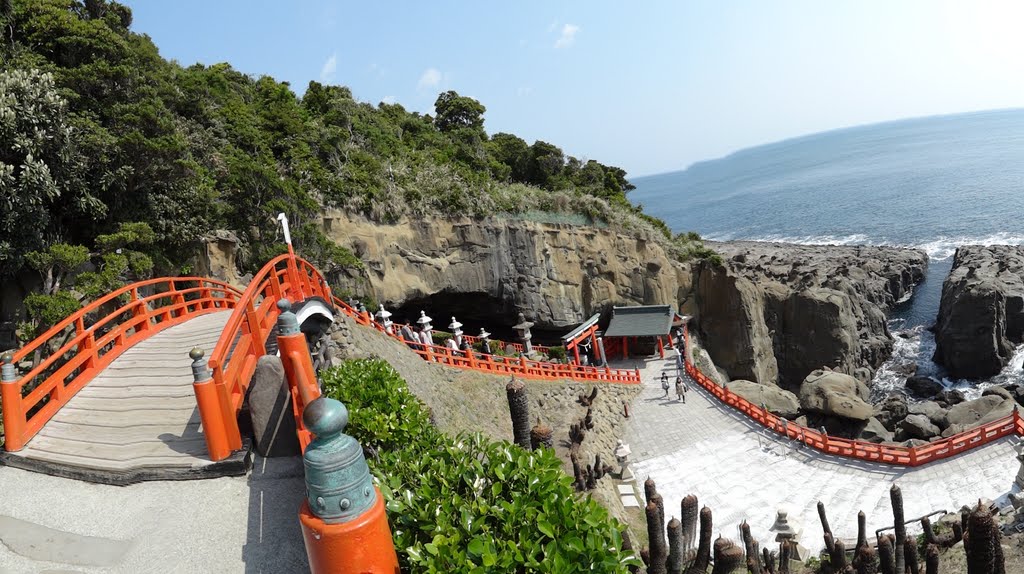About This Print
Print number seven of the fifty print series Scenes of Sacred and Historic Places (Seichi Shiseki Meisho) published by Uchida Woodblock Printing Company in 1941, depicting an outside wall of Hiroshima Castle in the foreground with the Imperial Headquarters (daihon'ei) in the mid-ground and the castle keep in the background. Hiroshima Castle, originally built in 1590, was destroyed in the atomic bombing. The keep was rebuilt in 1958.The Series - Scenes of Sacred and Historic Places
The print artist Tokuriki and the publisher Unsōdō created two series of prints to mark Kigen 2600, or the 2600th year of Japan's mythical founding as a nation. The first, a paean to Mount Fuji, a sacred site of pilgrimage and worship, titled Thirty-Six Views of Mount Fuji, harkened back to Hokusai’s famous 1831 series of the same name. The second series, Scenes of Sacred and Historic Places, capitalized on the nationalist ideology that Japan was a divine land, presenting overtly nationalistic landscapes including shrines, temples, castles, places associated with the divine origins of Japan, Meiji era history and samurai
culture.
In his commentary on this series, the artist wrote that his devotion to these sites is intended to demonstrate to the people the dignity of the national polity, going on to say that he advocates prints as a means of providing comfort and pleasure to the wholesome citizens of the nation.
This series was extremely popular with domestic and foreign buyers who purchased one thousand copies within a short time after issuance.1 I imagine that foreign buyers were enchanted by the lovely scenes with much of the import of each print escaping them. In the 1950s, six prints from this series were re-printed under the title The Album of Famous Views of Japan and eight additional prints were re-printed under the title The Eight Views of Japan. Later printings omit the information in the margin and some position the artist's signature and print title within the image in a different location from the original issue.
For images of all the prints in the series, go to the website of Ross Walker's Ohmi Gallery at http://www.ohmigallery.com/Gallery/Tokuriki/SacredPlaces.htm.
1 Modern Japanese Woodblock Prints - The Early Years, Helen Merritt, University of Hawaii Press, 1998, p. 89.
In his commentary on this series, the artist wrote that his devotion to these sites is intended to demonstrate to the people the dignity of the national polity, going on to say that he advocates prints as a means of providing comfort and pleasure to the wholesome citizens of the nation.
For images of all the prints in the series, go to the website of Ross Walker's Ohmi Gallery at http://www.ohmigallery.com/Gallery/Tokuriki/SacredPlaces.htm.
1 Modern Japanese Woodblock Prints - The Early Years, Helen Merritt, University of Hawaii Press, 1998, p. 89.
Margin Annotations of Original Edition (top to bottom) and Print Title Within Image
 series title Seichi Shiseki Meisho 聖地 史蹟 名勝 |  assigned number of print in series 七 (7) |  Tomikichiro kin saku 富吉郎 作 (made by Tomikichiro) followed by oval seal1 |  内田美術書肆版 (Uchida Fine Art Shop) followed in seal form by Fukyo Fukusei (Reproduction forbidden)) | Print Title  鵜戸神宮 (Udojingū) |
1 possibly a reproduction of an old censor's seal
The title of each print appears within the image area along with the artist's signature and seal. The artist's signature is comprised of the artist's name 富吉郎 (Tomikichirō) either by itself, as shown below, or followed by the single kanji character 作 (saku "made by"), as shown below, or by the character 謹 (kin "respectfully") followed by 作.

Udo Shrine
Source: japan-guide.com http://www.japan-guide.com/e/e8032.htmlUdo Shrine, located on the Nichinan Coast south of Miyazaki City, is dedicated to Yamasachihiko, the father of Emperor Jimmu, the mythical first emperor of Japan. This brightly painted shrine is set in a cave on the side of a cliff overlooking the ocean and so enjoys a spectacular view.
There are a few legends concerning Emperor Jimmu and this cave, although it is unclear whether he was born here or visited here as a baby. However, the one thing the stories have in common are the breast shaped rocks in the cave wall which are said to have nourished him.
| IHL Catalog | #1102 |
| Title | Udo Shrine 鵜戸神宮 Udojingū |
| Series | Scenes of Sacred and Historic Places (also seen translated as "Collected Prints of Sacred, Historic and Scenic Places") 聖地 史蹟 名勝 Seichi Shiseki Meisho |
| Artist | Tokuriki Tomikichirō (1902-2000) |
| Signature | 富吉郎 作 Tomikichirō saku |
| Seal |  |
| Date | September 1941 |
| Edition | original (first) edition |
| Publisher | Uchida Bijutsu Shoten |
| Impression | excellent |
| Colors | excellent |
| Condition | excellent - minor paper thinning top corners verso from previous folio mounting |
| Genre | shin hanga (new print); fūkeiga |
| Miscellaneous | 七 #7 in series |
| Format | horizontal oban |
| H x W Paper | 11 3/8 x 16 3/8 in. (28.9 x 41.6 cm) |
| H x W Image | 10 3/8 x 15 (26.4 x 38.1 cm) |
| Collections This Print | Penn Libraries, Rare Book & Manuscript Library - Rare Book Collection Call no.: Portfolio NE1325.T65 A4 1940 |
| Reference Literature |



